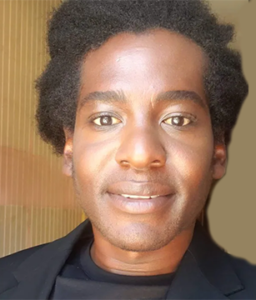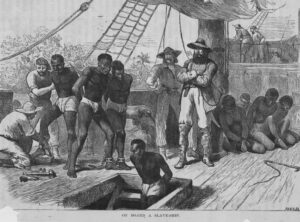
Unearthed: Slavery in Newfoundland and Labrador is a multipart radio documentary and digital series that examines connections of enslaved Black people in the province. It features Xaiver Michael Campbell and is produced by the CBC’s Heather Barrett, who is host and producer of Weekend AM. New episodes air on Fridays on CrossTalk on CBC Radio 1 and will be available as podcasts.
Newfoundlanders and Labradorians are attached to their history and their stories. They display history, heritage and culture to the world — much of it winds up in those colour-soaked, award-winning tourism ads.
But, as the saying goes, you take the good with the bad. And there is more to our history than some might know.
Ever since John Cabot landed somewhere along the province’s shores, Newfoundland — and its extremely abundant cod stocks — have been key players in building the so-called New World.
That’s why the majority of the province’s residents today, mostly descended from white, northern Europeans, are here today.
Indigenous people were here too, of course. But so were others.
“[Black] slavery was practised throughout the British Empire,” said Ngozi Paul, a Black Canadian actor, writer, and producer, and founder of Emancipation Arts, a multiplatform content creator company.
“If there was a colony, enslaving people was part of a general practice of the time.”
Newfoundland was part of the British Empire. Other colonizing countries — France, Portugal, Spain — have staked claims on our land and in our waters over the years.
From the 16th through the 19th centuries, more than 12 million enslaved Africans were brought against their will across the Atlantic Ocean, according to the National Museums Liverpool in July 2020. While it’s easy to believe terrible stories of enslaved Black people only happened elsewhere — such as the United States, the Caribbean and South America — enslaved Black people were brought against their will to Newfoundland.
It was in the latter part of the 17th century, according to Memorial University professor Barry Gaulton, that there emerged definitive documentary evidence for slave ownership in Newfoundland. That evidence lives in ships’ logs, church records and archeological digs.

A multipart digital and short radio documentary series, Unearthed: Slavery in Newfoundland and Labrador, aims to shine a light on that.
It features Xaiver Michael Campbell and is produced by the CBC’s Heather Barrett.
Campbell, a fiction writer living in St. John’s, was born and raised in Kingston, Jamaica. He’s on a mission to find out as much about Newfoundland’s history involving enslaved Black people as possible.
In the first episode, titled Who was W.H.? Campbell attempts to learn everything he can — with help from Afua Cooper, a history and Black studies professor at Dalhousie University — about the skeleton of a Black man unearthed in 1987 near a cemetery on the south coast of Labrador, with his military uniform remarkably intact. The initials W.H. were carved in the sole of his shoes and in his knife, according to Lori Temple, collections manager for the archeology and Indigenous Peoples collection at The Rooms.
Given his military uniform, he’s not believed to have been a slave, but W.H. is an entry point of sorts into the topic and little is known about him beyond the clothes on his back.
“This is perhaps the metaphor for Black history in Newfoundland: something that’s hidden,” said Cooper.
“So 200 years, this man laid there sleeping. Then one day he decided to rise up, and so this is what I think is happening now to Black history in Newfoundland.”
Over the course of the series, Campbell’s quest has him visiting cemeteries, viewing preserved artifacts — like knives and shoes — at The Rooms, and learning about the “Black Atlantic,” which refers to the fact that three times as many Africans crossed the Atlantic Ocean as Europeans, according to Camille Turner, an artist and a PhD Candidate in York University’s faculty of environmental studies.
In one episode, Campbell even makes a culinary link between the two islands he has called home, noting the prevalence of cod in both Jamaica and Newfoundland. But he also says ignoring the historical context of popular foodstuffs like Screech and molasses related to the slave trade does a similar disservice.
Researchers, historians, and storytellers — many of them Black — are doing the work of researching, recounting and preserving the experiences of Black people in eastern Canada, including Newfoundland and Labrador, and releasing their stories into the 21st century.
Looking at Newfoundland and Labrador’s history through a wider, and more sinister, lens may spur a wide range of feelings, but as Newfoundland folklorist Dale Jarvis said, “Sometimes we aren’t always the heroes of our own stories.”


